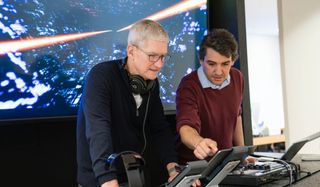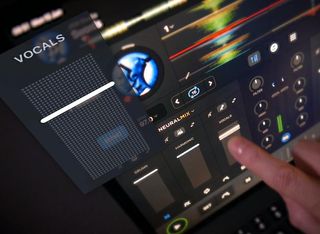Interview: Algoriddim CEO Karim Morsy hails 'fundamental breakthrough' of M1

djay Pro AI was one of the first apps to take advantage of Apple silicon and the new M1 chip. Announced last week, the popular DJing software now runs natively on Apple's M1 Macs and can use machine learning to break down beats, instruments, and vocals of a track in real-time. At the time of djay Pro AI's release, Algoriddim hailed Apple's new M1 chip, which it said had enabled up to 15x faster machine learning, "ultra-low latency" and "unprecedented precision." The brains behind one of the best and earliest embodiments of the power of Apple silicon, we sat down with CEO Karim Morsy to talk about the new update and the future of Apple's breakthrough new chip.
Morsy founded Algoriddim back in 2006 with two university friends, and holds degrees in computer science, music, and psychology. Headquartered in Germany, Algoriddim is 100% self-funded, and its djay software has been downloaded by over 50 million people. The goal? Make DJing accessible to everyone, whilst empowering people to express themselves through music.
From an Apple intern to a developer success story! Wonderful to see how Karim Morsy and @Algoriddim are making DJing accessible to everyone. Thanks for a great visit! 🎶 🇩🇪 pic.twitter.com/eUCBdjWrJOFrom an Apple intern to a developer success story! Wonderful to see how Karim Morsy and @Algoriddim are making DJing accessible to everyone. Thanks for a great visit! 🎶 🇩🇪 pic.twitter.com/eUCBdjWrJO— Tim Cook (@tim_cook) September 29, 2019September 29, 2019
Funnily enough, Morsy actually started his professional career as an Apple intern, developing audio features for iMove at Cupertino during what he describes as "the advent of the mobile revolution." I asked him about Algoriddim's new software, and what Apple silicon means for us all. This is what he had to say:
Q. The new djay Pro AI app is a fantastic new release, just how important is the app to you as a company?
Morsy: djay Pro AI for Mac is a landmark release for Algoriddim. Everything we've learned developing and innovating on Apple's platforms for over a decade went into this product, plus a new foundation based entirely on machine learning.
DJs have been using equalizers and filters for decades to minimize clashing of vocals and melodies during a transition. The ability to actually separate out vocals, drums, and instrumentals of any song is a dream come true for both DJs and producers. Users can now simply remove the vocals in real-time when transitioning from one song to the next. They can even crossfade melodies and drums separately, or create entirely new music by swapping the bass line of one song with the guitar of another song, for instance.
Q. You mention the power of the M1 chip from Apple in your release, how long have you been waiting for a breakthrough like this from Apple?
Master your iPhone in minutes
iMore offers spot-on advice and guidance from our team of experts, with decades of Apple device experience to lean on. Learn more with iMore!
Morsy: Well, it's a fundamental breakthrough indeed, and the Apple Neural Engine has already been available to developers since the introduction of the iPhone Xs. It's just taken some time for the developer community to catch up, really go back to the drawing board, and see what can be done with this enormous processing power for machine learning type use cases in particular.
The Mac is home to many of our power users, so we're really excited to see Apple bring these groundbreaking advancements to the Mac platform, further unifying the user experience across iOS and macOS.
Q. What were your first, initial reactions to Apple's M1 announcements? And how long have you been working with M1?
Morsy: Our first reaction was… wow, "desktop-class" just got a whole new meaning.
We knew we could bring our existing AI music features from iOS to macOS and double down on machine learning with all the extra processing power available. We've been using the Mac Developer Transition Kit prior to launch to really make sure our new app shines on M1-powered Macs from day one.

Not everyone is a DJ in the making, but every Apple silicon Mac user stands to benefit from the power of M1. Based on Algoriddim's own experience, Morsy says that consumers "can expect their apps to run faster than ever out of the box", and that as more developers bring native Apple silicon support to their apps, this will only improve. Longer-term, it gets even more exciting...
"I believe there will be a paradigm shift across a wide range of apps," says Morsy. "CoreML and the Neural Engine will allow developers to create smart features and user experiences that weren't even imaginable just a few years ago, and these AI-powered features will allow users to benefit from existing apps in completely new ways. Neural Mix in djay Pro AI for example is a prime example of a new class of AI-powered music features, and it has powerful implications for artists who in turn will be able to transform and reinvent their own art form respectively."
Apple's performance claims aren't just hot air either. Morsy says that Algoriddim has seen the power of M1 first-hand and that they really are getting 15x faster machine learning performance with their app. For consumers, Morsy says that translates to "snappier, more feature-rich applications" for Pro and regular users alike, stating:
"Pro users in the context of live performance apps, in particular, will appreciate significantly reduced latency with complex tasks such as separating out the vocals from a track, synthesizing sounds, or time-stretching audio and video in real-time."
Some eyebrows have been raised by the first Apple silicon Macs "limited" 16GB of RAM. But Morsy isn't concerned, and in fact, says there may be benefits from mobile memory optimizations which will translate to the Mac:
A lot of developers these days also share much code between mobile and desktop platforms, which means that many memory optimizations done for more memory-constrained mobile devices, will also benefit desktop apps. That's also true for system frameworks, many of which not only have to run well on an M1-powered Mac but also, for example, on an Apple Watch.
Algoriddim, djay Pro AI, and the M1 chip are just the tip of the iceberg. Early reviews of Apple's M1-based machines, including our own reveal that the Apple has delivered something truly special with the first of its Apple silicon chips. The best bit? They're just getting started.

Stephen Warwick has written about Apple for five years at iMore and previously elsewhere. He covers all of iMore's latest breaking news regarding all of Apple's products and services, both hardware and software. Stephen has interviewed industry experts in a range of fields including finance, litigation, security, and more. He also specializes in curating and reviewing audio hardware and has experience beyond journalism in sound engineering, production, and design. Before becoming a writer Stephen studied Ancient History at University and also worked at Apple for more than two years. Stephen is also a host on the iMore show, a weekly podcast recorded live that discusses the latest in breaking Apple news, as well as featuring fun trivia about all things Apple. Follow him on Twitter @stephenwarwick9
Most Popular



